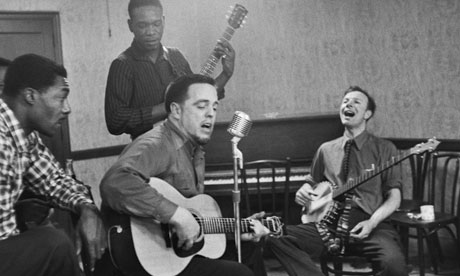It may be hard, almost half a century later, to imagine the emotional turbulence experienced by a white, middle-class English schoolboy while listening intently to a recording of four black prisoners at the state penitentiary in Parchman, Mississippi, swinging their axes and intoning the overlapping lines of a work song with hoarse, urgent voices. But from such moments – the revelation of a new world of feeling, at once distant and exotic yet seeming more immediately relevant than anything the boy had absorbed from the voices of his own culture – a revolution, of sorts, would be made.
Alan Lomax was the man who made that particular moment possible when, in 1948, he persuaded the Parchman authorities to allow him to lug a cumbersome tape recorder to the place where the inmates were chopping timber. It was one of thousands of such field recordings for which he was responsible, the majority of them documenting the folk culture of the southern United States; on its release in 1957, as part of an album titled Murderers' Home, it became a text to be studied by the generation of young British musicians who were beginning to claim the language of the blues as their own.
Lomax died in 2002, aged 87, leaving behind a personal collection of 5,000 hours of sound recordings, 400,000 feet of film, 2,450 videotapes and countless documents, all eventually to join the many more held by the Library of Congress, on whose behalf he had worked for many years. If he was not the first to collect the songs of the hidden vernacular cultures of the United States – his father, John A Lomax, was among his predecessors – his enthusiasm and ambition made him the best known and the most effective, even today, when the fruits of his investigations are more freely available and closely scrutinised than ever.
Disorganised in his private life, Lomax was the most meticulous of researchers into folk culture. "It is very important," wrote the man who had played a vital role in the careers of Lead Belly, Muddy Waters, Woody Guthrie and Burl Ives, "to record the tuning of all instruments which play a part in the music, to photograph the instruments and to get the informant to explain how he plays it." Thanks to his diligence, we retain accurate and vivid documentation of music that has already passed into history.
If this makes Lomax sound like a sort of lepidopterist of the blues, nothing could be further from the truth. He saw his own unquenchable energy – that of a large, unruly Texan who never bothered to camouflage his origins – reflected in the continuing life-force of the music and musicians (and dancers and storytellers) whom he recorded. It was the future he wished to preserve, through an accurate transcription of the past as it survived in the present. "Folklore may prove to be, not a romantic and colourful ragbag of the discarded and outworn ideas of humanity, but one of the great wellsprings of the democratic attitudes that have in the past two centuries begun to make for a more equitable life for all mankind upon this planet," he wrote to the Guggenheim Foundation in 1946, in one of his many applications for funding.
John Szwed, a Yale professor whose previous studies of Sun Ra and Miles Davis raised the bar for jazz biography, knew Lomax in his later years and has enjoyed access to surviving family and colleagues, as well as to an immense trove of unpublished documentation. The result is an extensive portrait of a brilliant and difficult man who, astonishing as it may now seem, spent most of his career battling the indifference of those in a position to help him preserve the irreplaceable.
An early apprenticeship to his father filled Lomax with an impatience that would cost him dear. When he applied for grants, his lack of postgraduate qualifications closed many doors. At 17 he was already seeking funds to record music in the South, in places "where Negroes are almost entirely isolated from whites", but he would go through most of his life struggling to subsidise his work with the income from lecturing and performing, from broadcasts, from compiling anthologies for commercial record companies and, most controversially, from the limited royalties he acquired by adding his name as a co-composer of songs that achieved broad popularity, such as Lead Belly's "Goodnight, Irene".
It was in Haiti in 1936, with Zora Neale Hurston as his guide, that the 21-year-old Lomax acquired his methodology. "I have to learn diplomacy," he wrote to his father, "how to collect, how to handle a servant, how to beat the tambour, how to dance, how to bargain, how to lie, how to run the new recorder, how to take notes, how to budget and keep accounts, all on top of my personal problems, which have formerly kept me completely occupied. And, God, this world is beautiful, beautiful and strange." The lessons were learnt so well that he would subsequently encounter little trouble in persuading Galician fishermen, Hebridean weavers, the shepherds of Campania or the Baptist preachers of Georgia's Sea Islands to perform for his microphone, thus opening up these "beautiful and strange" worlds to general view for the first time.
His political views were another handicap. He was already under surveillance by the FBI as a suspected communist when, at Eleanor Roosevelt's invitation, he played his banjo and sang for King George VI and Queen Elizabeth at a White House function in 1939. Three years later, at a time when he was making radio programmes for the Office of War Information, he was pulled in for questioning. In 1948, when Dwight D Eisenhower, then president of Columbia University, joined forces with the US Public Health Service to publicise the use of penicillin as a remedy for venereal diseases, Lomax made a series of short radio "ballad dramas" featuring Guthrie, Sister Rosetta Tharpe and others to promote the message; two years later, however, he was being named – along with Orson Welles, Gypsy Rose Lee and Leonard Bernstein – as a possible subversive.
His path was often blocked as, in Szwed's words, he "stepped uneasily between the world of commerce and entertainment and the abstemious, hermetic life of scholars". His insatiable appetite for discovery, however, generally saw him through. "I never knew an American who more fully embodied the virtues – and the more engaging vices – of all his countrymen," wrote DG Bridson, a BBC producer who collaborated with Lomax during his stay in Europe from 1949-58. Ewan MacColl, with whom he sang in a London-based skiffle group, described him as "a man given to furious bursts of energy which only ceased when he was on the verge of collapse". But not everyone admired him. Some disputed his belief that a song's "collector" should share in the rewards from the copyright, while his sheer ubiquitousness prompted a Punch cartoonist to depict a hillbilly sitting on the step of a shack with the caption: "I got those Alan-Lomax-ain't-been-round-to-record-me blues."
In later years he devoted his energies to something he called cantometrics, classifying the patterns of singing (and, in choreometrics and parlametrics, dancing and speech) so as to relate them to modes of behaviour and social structures; at his death he was beginning to construct a "general theory" which he believed could form a defence of endangered cultures, not least against the spread of American influence. "The primary function of music," he had written in 1954, "is to remind the listener that he belongs to one certain part of the human race, comes from a certain region, belongs to a certain generation. The music of your place . . . is a quick and immediate symbol for all the deepest emotions the people of your part of the world share."
For the full drama of such moments as the discovery of the 26-year-old Muddy Waters on a Delta plantation and the emergence of Fred McDowell, guitar in hand, out of a Mississippi wood, one must refer to Lomax's own volume, The Land Where the Blues Began, or the affectionate memoir, America Across the Water, in which the English folk singer Shirley Collins describes her time as his companion and assistant. But I finished this book – a tale of a thousand thwarted schemes as well as of immense achievement – experiencing a renewed gratitude towards a remarkable man, without whose fierce commitment the modern world would have sounded and felt very different.











